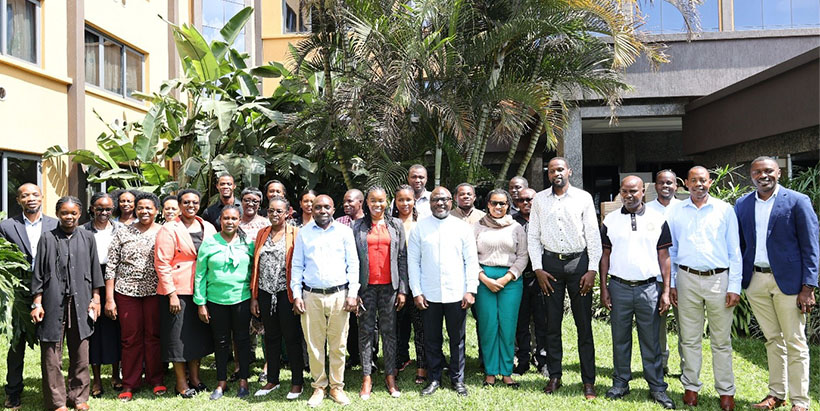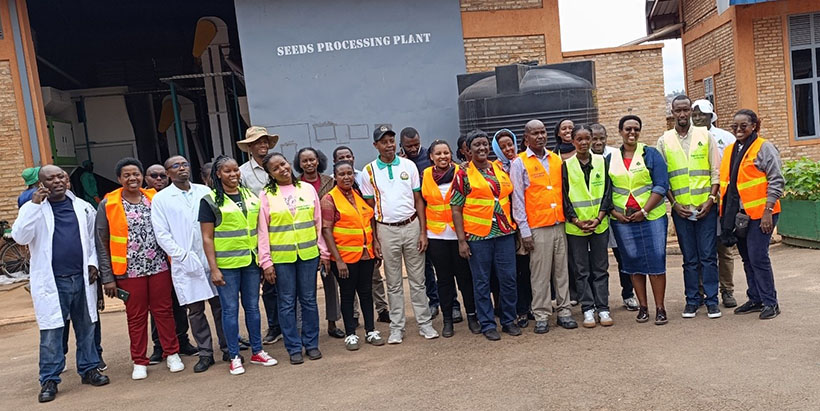Kenya
2 May 2025
 The seed inspectors and beneficiaries of the training.
The seed inspectors and beneficiaries of the training.
Ensuring farmers have access to high-quality seeds is fundamental to improving agricultural productivity and food security. However, Rwanda has faced challenges with clean seed circulation due to gaps related to seed inspection, evaluation, and certification processes.
To bridge this gap, the International Institute of Tropical Agriculture (IITA), in collaboration with Seed Systems Group (SSG) and Kenya Plant Health Inspectorate Service (KEPHIS), organized a six-day intensive training program for 27 seed inspectors and laboratory technicians from the Rwanda Inspectorate, Competition and Consumer Protection Authority (RICA) and Rwanda Agriculture and Animal Resources Development Board (RAB). This initiative aimed to enhance the capacity of seed inspectors to strengthen the enforcement of seed quality standards and regulations in Rwanda.
This training builds on a previous session held in Nigeria, where seed companies participated in a capacity-building initiative led by IITA to advance hybrid maize seed production. Participants visited IITA’s maize breeding research facilities and Nigerian seed companies, gaining insights into advanced seed technologies. These sessions engaged diverse seed sector stakeholders, including representatives from seed companies, seed inspectors, and laboratory analysts drawn from various institutions across Rwanda, intending to build technical capacity and foster a more robust seed system.
Whether locally produced or imported, seed quality is a crucial concern for Rwandan farmers. Insufficient skills and capacities within regulatory bodies can hinder effective quality control and certification. Recognizing this issue through discussions with RICA and RAB leadership, IITA committed to strengthening the capacity of seed inspectors through specialized training programs.
 The seed inspectors, along with the trainers from KEPHIS, during a visit to Rumbuka Seeds processing facility in Kamonyi District.
The seed inspectors, along with the trainers from KEPHIS, during a visit to Rumbuka Seeds processing facility in Kamonyi District.
The training combined theoretical sessions with hands-on practical experiences to provide participants with a comprehensive understanding of seed inspection, testing, processing, traceability, and certification. Trainers led interactive sessions on seed processing operations, certification protocols, and compliance with international standards. Participants also had the opportunity to visit one of the seed processing facilities at Rumbuka Seeds Ltd, where they observed different processes involved in seed processing and quality control, such as cleaning, grading, coating, packaging, and quality control in the laboratory.
Additionally, trainers shared experiences from Kenya’s seed certification procedures, as the country is a leader in seed certification and traceability in Africa. This gave Rwanda’s inspectors valuable insights into best practices that could help strengthen and amplify their certification systems.
For many participants, this training was a game-changer in their professional development. Jovia Kamatenesi, a Seed Inspector from RAB, expressed her appreciation: “I have benefited greatly from this training, especially as a seed inspector. The knowledge gained will enable me to ensure that the certification process follows international standards, meeting critical requirements such as germination rate and seed purity.”
Others echoed similar sentiments, highlighting that the skills acquired would enhance their ability to monitor and certify seeds more effectively, ultimately improving seed quality and availability for farmers across Rwanda.